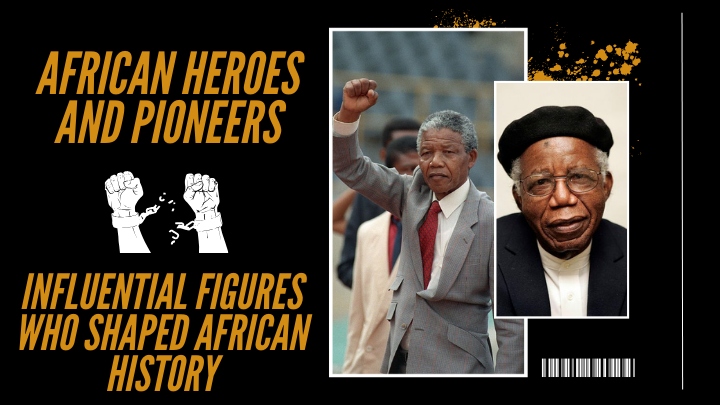African Heroes and Pioneers
Africa’s history is rich with powerful figures whose courage, vision, and determination shaped the continent’s social, political, and cultural landscape. From revolutionary leaders to trailblazing activists and innovators, these African heroes and pioneers not only left an indelible mark on the history of Africa but also continue to inspire African communities worldwide. Their legacies of resilience, unity, and progress continue to serve as guiding lights for future generations, particularly African communities in the diaspora, including in Australia.
In this article, we celebrate the lives and achievements of iconic African leaders, activists, and visionaries who have profoundly influenced African history and continue to inspire hope, unity, and change across the globe.
1. Nelson Mandela: The Father of South Africa's Democracy
One of the most celebrated figures in African history, Nelson Mandela is a symbol of resilience, justice, and reconciliation. Born in 1918 in the rural village of Mvezo, South Africa, Mandela’s journey from a lawyer and political activist to the first Black president of South Africa is legendary.
- Struggle Against Apartheid: Mandela’s leadership in the African National Congress (ANC) and his pivotal role in the anti-apartheid movement made him a global icon for justice and equality. After spending 27 years in prison, Mandela was released in 1990, leading South Africa through a peaceful transition from a system of racial segregation to democracy.
- Legacy of Reconciliation: Mandela’s commitment to reconciliation and nation-building helped to heal the wounds of apartheid and unite South Africa. His work in promoting peace and justice earned him the Nobel Peace Prize in 1993. Mandela’s life continues to inspire global movements for social justice and human rights, motivating African communities worldwide to fight for equality and the rights of marginalized people.
- Inspiration for the Diaspora: Mandela’s story resonates deeply with African communities in the diaspora, who see in him a figure of hope, unity, and perseverance. His advocacy for social justice and the empowerment of African people serves as a beacon for communities in Australia and beyond, as they continue to fight for their rights and recognize the power of collective action.
2. Kwame Nkrumah: The Visionary Father of African Liberation
Kwame Nkrumah, born in 1909 in Ghana, was the first president of the country and a visionary leader who spearheaded the movement for African independence. His profound belief in pan-Africanism and the unity of African nations made him one of the most influential political figures in modern African history.
- Champion of Pan-Africanism: Nkrumah’s leadership extended beyond Ghana’s independence in 1957. He became a champion of pan-Africanism, advocating for the political, economic, and cultural unity of all African nations. Nkrumah envisioned a united and self-sufficient Africa, free from colonial domination, and his dream inspired movements across the continent.
- Legacy of Pan-African Unity: Nkrumah’s ideas shaped the formation of the Organisation of African Unity (OAU), which was established in 1963 to promote unity and cooperation among African states. His call for African unity and self-determination continues to influence contemporary African politics and unity efforts.
- Influence on the Diaspora: Nkrumah’s impact on African communities in the diaspora, especially in the Caribbean and the United States, remains significant. His message of self-reliance, pride in African heritage, and political unity resonates deeply with those who identify with the struggle for equality and justice, particularly African Australians who connect with his vision of a united African continent.
3. Haile Selassie: The Lion of Judah and Symbol of African Sovereignty
Emperor Haile Selassie I, born in 1892, was the last reigning monarch of Ethiopia and a key figure in the fight for African independence. His reign and leadership in the pan-African movement made him an influential icon, both in Africa and in the African diaspora.
- Defender of African Sovereignty: Haile Selassie’s leadership in resisting foreign occupation, particularly during the Italian invasion of Ethiopia in the 1930s, cemented his status as a symbol of African resistance and sovereignty. Ethiopia was one of the few African nations to remain independent during the colonial era, and Haile Selassie’s staunch defense of Ethiopian independence was a rallying cry for African nations fighting against European colonialism.
- Advocate for African Unity: Haile Selassie was a strong advocate for African unity and independence, leading the formation of the Organization of African Unity (OAU) in 1963, which later evolved into the African Union (AU). His belief in a united Africa continues to inspire movements for political and economic collaboration among African nations.
- Rastafari Movement: Haile Selassie’s influence extends beyond Africa. He is regarded as a divine figure in the Rastafari movement, which originated in Jamaica in the 1930s and has spread globally, particularly among African diaspora communities. The Rastafari movement celebrates African heritage, spirituality, and a return to African roots, with Haile Selassie as a symbol of strength and pride.
- Impact on African Australians: For African Australians, Haile Selassie represents a connection to African roots and a powerful figure of resistance against oppression. His leadership continues to inspire pride in African heritage and unity, especially among those who trace their ancestry to Ethiopia or the wider Horn of Africa region.
4. Wangari Maathai: Environmental Activist and Nobel Laureate
Wangari Maathai, born in 1940 in Kenya, was a pioneering environmentalist, political activist, and the first African woman to receive the Nobel Peace Prize in 2004. Maathai’s advocacy for the environment, women’s rights, and human dignity made her one of Africa’s most respected leaders.
- Founder of the Green Belt Movement: Maathai founded the Green Belt Movement in 1977, a grassroots organization focused on environmental conservation, women's empowerment, and community development. Her efforts to combat deforestation and promote sustainable land use led to the planting of over 50 million trees in Kenya and beyond.
- Champion of Women’s Rights and Social Justice: Maathai was a tireless advocate for women’s rights and social justice. Her work challenged gender inequality, encouraged political participation among women, and promoted environmental sustainability as a means of achieving economic stability. Her activism earned her the Nobel Peace Prize, recognizing her efforts to bring environmental and women’s issues to the forefront of global development.
- Legacy in the Diaspora: Wangari Maathai’s legacy resonates strongly with African communities in the diaspora, especially those involved in environmental and social justice causes. Her commitment to empowerment, sustainability, and community action is a model for African Australians working to address environmental and gender inequalities in their own communities.
5. Chinua Achebe: The Voice of African Literature
Chinua Achebe, born in 1930 in Nigeria, was a towering figure in African literature. His novel, Things Fall Apart, is widely regarded as one of the most important works of modern African literature and remains a cornerstone of post-colonial studies.
- Challenging Colonial Narratives: Achebe’s writing challenged colonialist portrayals of African societies, offering a nuanced and complex view of African life before, during, and after colonial rule. Through his work, Achebe provided African people with a voice in literature, reclaiming African history and culture from the lenses of European colonizers.
- Legacy of African Literature: Achebe is often referred to as the “father of African literature,” and his work has inspired countless writers across the continent and in the diaspora. His emphasis on storytelling, cultural pride, and the preservation of African identity has influenced generations of African writers, including many African Australians who turn to literature to reflect their own experiences and histories.
- Impact on the Diaspora: Achebe’s work has had a profound impact on African diaspora communities worldwide. His novels, essays, and poetry are studied in universities across the globe, and his influence continues to inspire young African Australians to engage with their history, heritage, and the power of the written word.
The heroes and pioneers of Africa’s past—leaders, activists, intellectuals, and innovators—continue to inspire African communities in the diaspora, including in Australia, to fight for justice, unity, and empowerment. Figures like Nelson Mandela, Kwame Nkrumah, Haile Selassie, Wangari Maathai, and Chinua Achebe represent the strength, resilience, and vision of Africa. Their legacies serve as a powerful reminder that African history is not only a source of pride but also a foundation upon which future generations can build a better, more equitable world. As African Australians continue to navigate their identities and contribute to Australia’s multicultural society, these heroes and pioneers remain a source of inspiration and a beacon for progress, justice, and unity.



